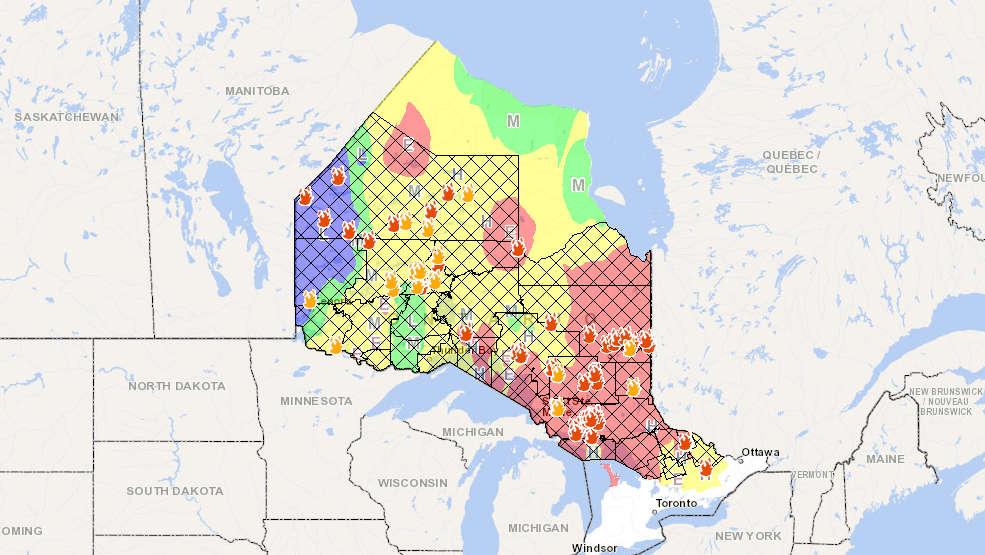Number of Ontario forest fires doubled compared to same time last year
Ontario has already experienced double the number of forest fires this year compared to the same six months in 2022.
According to provincial data, there have been 167 forest fires so far in 2023.
Between January 1 and June 7 of last year, there were 78.
The data also reveals this is more than the 10-year average of 157 fires.
- Download our app to get local alerts on your device
- Get the latest local updates right to your inbox
Much of the province has been placed within a Restricted Fire Zone – which prohibits “open air burning” within the area – as wildfires rage across Ontario and Quebec. As of Wednesday afternoon, the Ministry of Natural Resources and Forestry said there were 54 active fires, with 29 labelled as “not under control.”
Smoke from these fires has severely impacted air quality throughout the province, with Environment Canada saying it presents a “high risk”.
Speaking in the legislature, the New Democratic Party bombarded the government with questions related to climate change, saying this summer is “probably the most severe fire season our province has ever experienced.”
Premier Doug Ford, in return, said he was shocked the opposition party would politicize wildfires. The government is prepared to handle the wildfires, Ford said without addressing the opposition’s climate change concerns.
“We have 142 fire ranger crews, which are the best in the world, ready to go right across our province and we have a fleet of 28 aircraft that fight these fires, including nine heavy water bombers,” he said, noting the majority of fires are started by lightning or campfires.
“My number one goal is to make sure the communities and the people are safe here in Ontario.”
 A map of Ontario's Restricted Fire Zones as of June 7, 2023.
A map of Ontario's Restricted Fire Zones as of June 7, 2023.
However, a union representing fire rangers says they are short-staffed to deal with the wildfire season.
“There's a recruitment and retention problem that's directly related to the types of choices that the government has made about the lack of investment in fire Rangers over the years,” JP Hornick, President of the Ontario Public Service Employees Union (OPSEU), told CTV News Toronto.
Hornick said she is seeing a 25 per cent reduction in the number of crews available compared to last year. Short contracts and low wages are contributing factors, she added.
“Even in sheer numbers, there's just not enough people to do this work. But there's also not enough people who are experienced and can lead this work,” Hornick said.
"These are people who are in some of the most dangerous fire situations you can imagine, and they're paid less than municipal firefighters."
The Minister of Natural Resources said that Ontario is able to call for reinforcements from other provinces and countries should it need to.
“We have four water bombers from Minnesota assisting us right now and we’re thankful for that because we all work together,” Graydon Smith said.
Back in May, Ontario sent just over 40 firefighters to Alberta as the province struggled to control an “unprecedented” start to its wildfire season.
With files from the Canadian Press.
CTVNews.ca Top Stories

5 rescued after avalanche triggered north of Whistler, B.C. RCMP say
Emergency crews and heli-skiing staff helped rescue five people who were caught up in a backcountry avalanche north of Whistler, B.C., on Monday morning.
Quebec fugitive killed in Mexican resort town, RCMP say
RCMP are confirming that a fugitive, Mathieu Belanger, wanted by Quebec provincial police has died in Mexico, in what local media are calling a murder.
Bill Clinton hospitalized with a fever but in good spirits, spokesperson says
Former President Bill Clinton was admitted Monday to Georgetown University Medical Center in Washington after developing a fever.
Trump again calls to buy Greenland after eyeing Canada and the Panama Canal
First it was Canada, then the Panama Canal. Now, Donald Trump again wants Greenland. The president-elect is renewing unsuccessful calls he made during his first term for the U.S. to buy Greenland from Denmark, adding to the list of allied countries with which he's picking fights even before taking office.
UN investigative team says Syria's new authorities 'very receptive' to probe of Assad war crimes
The U.N. organization assisting in investigating the most serious crimes in Syria said Monday the country’s new authorities were “very receptive” to its request for cooperation during a just-concluded visit to Damascus, and it is preparing to deploy.
Pioneering Métis human rights advocate Muriel Stanley Venne dies at 87
Muriel Stanley Venne, a trail-blazing Métis woman known for her Indigenous rights advocacy, has died at 87.
King Charles ends royal warrants for Ben & Jerry's owner Unilever and Cadbury chocolatiers
King Charles III has ended royal warrants for Cadbury and Unilever, which owns brands including Marmite and Ben & Jerry’s, in a blow to the household names.
Man faces murder charges in death of woman who was lit on fire in New York City subway
A man is facing murder charges in New York City for allegedly setting a woman on fire inside a subway train and then watching her die after she was engulfed in flames, police said Monday.
Canada regulator sues Rogers for alleged misleading claims about data offering
Canada's antitrust regulator said on Monday it was suing Rogers Communications Inc, for allegedly misleading consumers about offering unlimited data under some phone plans.
































